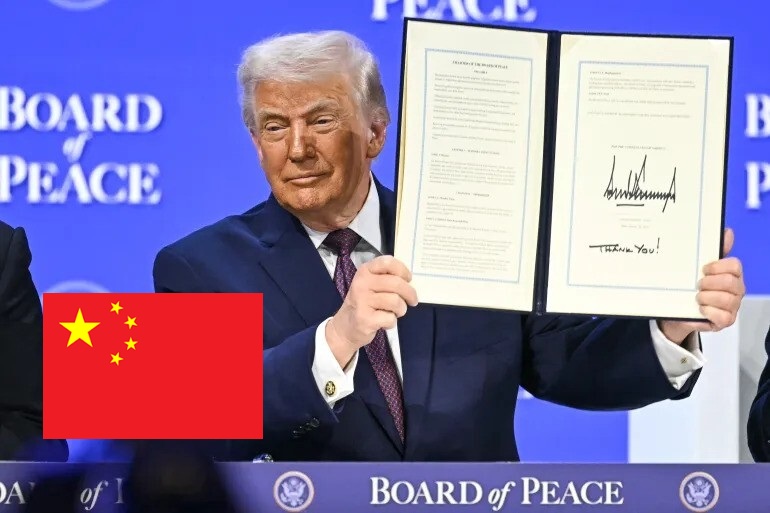The journey of rise
The fastest rise of China’s in the race of becoming influential global superpower is one of the most important geopolitical developments of the 21st century. With its second largest economy in the world, impressive military and growing technical and diplomatic influence, China is changing the dynamics of international power.
Since the onset of economic reforms in 1978, China has lifted hundreds of millions of people from agricultural society from poverty and has since the late 1970s from Deng Xiaoping’s economic reform into a rapidly growing industrial and technological giant. With corporate open-minded policies, the country constitutes market-oriented principles and simultaneously advocates centralized management. Often called “socialism with Chinese wealth,” this hybrid model has allowed China to highlight hundreds of millions of people out of poverty and become a manufacturing center around the world.

Under the direction of the Chinese Communist Party (CPC), the state pursues ambitious initiatives such as the Belt and Street Initiative (BRI) to expand the economic scope of Asia, Africa and Europe. The modernization of its military and its assertive attitude in the South China Sea indicate its growing strategic ambition. China is investing in progressive weapons, cyber skills and maritime power.
HISTORICAL PERSPECTIVE
The rise to superpower status is attributed to the long history of the resilience to be strategic in China. After experiencing a hundred years of foreign invasion and period of internal decadence, commonly known as the Century of Humiliation, China reclaimed its sovereignty in 1949 through the formation of People Republic under Communist government. The first decades were characterized by ideological campaigns and problems of economy but they also prepared the land to a centralized strong state.
 The critical turning point was recorded in 1978 with the introduction of market-oriented reforms by Deng Xiaoping. These reforms welcomed foreign investments into China, and the increase of industrialist, as well as making China a manufacturing hub in the world. China has enjoyed double-digit GDP increases over the past decades that are unprecedented leading the country to come out of poverty that has taken hundreds of thousands of people by pulling them out of poverty to be the second-largest economy in the globe.
The critical turning point was recorded in 1978 with the introduction of market-oriented reforms by Deng Xiaoping. These reforms welcomed foreign investments into China, and the increase of industrialist, as well as making China a manufacturing hub in the world. China has enjoyed double-digit GDP increases over the past decades that are unprecedented leading the country to come out of poverty that has taken hundreds of thousands of people by pulling them out of poverty to be the second-largest economy in the globe.
The economic power that has resulted thus has led to the ambitions of China in the international arena. China is increasing its footprint in Asia, Africa and other parts of the world via programs such as the Belt
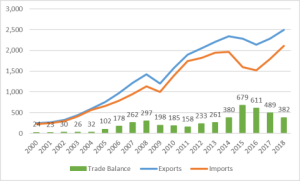 and Road Initiative, technological advancement, and modernization of the military. Its rise can be attributed to a well thought-out historical improvement: the substitution of seclusion and exploitation with integration in the international environment and assuming world stage leadership roles. The revival of China is not merely economic, it is strategic in its nature- because it is based on national pride, long-term strategic planning, and continuity of its historical path.
and Road Initiative, technological advancement, and modernization of the military. Its rise can be attributed to a well thought-out historical improvement: the substitution of seclusion and exploitation with integration in the international environment and assuming world stage leadership roles. The revival of China is not merely economic, it is strategic in its nature- because it is based on national pride, long-term strategic planning, and continuity of its historical path.
ECONOMIC GIANT
- Second largest economy in the world (after USA)
- Largest exporter globally
- World’s biggest manufacturing hub
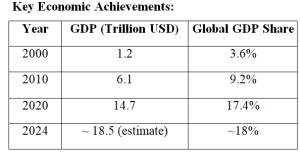 Major Economic Sectors:
Major Economic Sectors:
- Agriculture
- Manufacturing
- Technology
- Rice, wheat and vegetables
- Electronics, textiles, steel and electric vehicles
- Huawei and Alibaba , AI, robotics and space technology
Belt and Road Initiative (BRI):
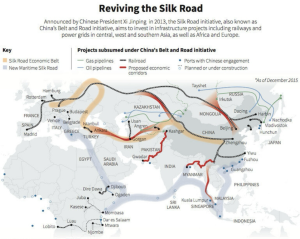
- BRI launched by China in 2013
- Massive global development project across Asia, Africa and Europe
- Involves over 140 countries
- Major investment in infrastructure like ports, railways, highways and energy projects
- Major investment in infrastructure like ports, railways, highways and energy projects
Trade and Global Role:
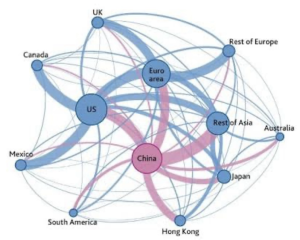
- Major exporter of electronics, machinery, clothing and medical equipment
- Heavily imports raw materials such as oil, iron ore and soybeans
- Become top trading partner for over 120 countries
MILITARY ADVANCEMENTS
China is quickly growing stronger in military power, which is changing the power balance in the world. The country is making new fighter jets like the J-36 and J-50. These jets have advanced stealth (can hide from radar) and use artificial intelligence (AI) to help in fighting. China has also built a very fast missile called the DF-17 that can travel more than five times the speed of sound.
China is using smart, AI-powered drones for spying and attacks, and it is also working on using many drones together in swarms to confuse and defeat enemies. In space, China is building weapons that can stop or destroy enemy satellites and systems that can block signals.
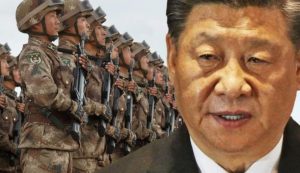 In 2025, China increased its defense budget by 7.2%, showing that it wants to keep improving its military fast and become a leader in military technology. China is also pursuing space-based military operations, including anti-satellite weaponry and electronic jamming systems. With a 7.2% increase in its defense budget for 2025, China is poised to continue its rapid military modernization and achieve technological superiority.
In 2025, China increased its defense budget by 7.2%, showing that it wants to keep improving its military fast and become a leader in military technology. China is also pursuing space-based military operations, including anti-satellite weaponry and electronic jamming systems. With a 7.2% increase in its defense budget for 2025, China is poised to continue its rapid military modernization and achieve technological superiority.
TECH CAPABILITIES
China has given priority to techno-nationalism in the current century which is the center of attention in the contemporary world. In the 21st century, Chinese policy is marked by prominent growth of emerging technologies integrated national security nexus in order to achieve technological self-sufficiency and dominance, based on agenda known as techno-nationalism. Techno-nationalism is a concept that views technology as a strategic asset and a means to gain national security interests as well as to exercise power and influence. China’s active role in incorporating technology in its national security frameworks and achieving techno-nationalist agenda is reshaping global as well as regional power dynamics.
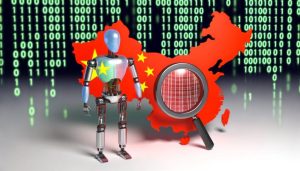 China’s national security strategy under Xi jinping has brought technological innovative agenda to the forefront with broader ambitions of global tech leadership. China’s National Security Policy of 2015 named ‘Made in China 2025’ prioritizes AI and critical technological innovation. ‘New Generation Artificial Intelligence Development Plan’ (AIDP) is another key policy which aims to make China excel , rise and lead in AI globally.
China’s national security strategy under Xi jinping has brought technological innovative agenda to the forefront with broader ambitions of global tech leadership. China’s National Security Policy of 2015 named ‘Made in China 2025’ prioritizes AI and critical technological innovation. ‘New Generation Artificial Intelligence Development Plan’ (AIDP) is another key policy which aims to make China excel , rise and lead in AI globally.
China has excelled in emerging technologies like Dual-Use Artificial Intelligence, Lethal Autonomous Weapon Systems i.e. CH-series drones and Blowfish A2 drone. Kinetic and non-kinetic Artificial Satellites. The Micius Satellite of China has capacity of highly secure and long range quantum key distribution. China has also excelled in 5G & 6G Infrastructure. Huawei & ZTE like Chinese tech giants are leading in 5G which has potential military applications, particularly in enhancing battlefield networking.
POLITICAL AND DIPLOMATIC INFLUENCE
The rise of China is no longer just a possibility to be imagined. It is an established fact. So is the increasing impact of a more powerful and confident China on the rest of the world, and the increasing impact that the rest of the world is having on China. Both are unprecedented. China’s interaction with the rest of the world provides a window on how a rising China practices diplomacy. This provides new challenges to which students of contemporary diplomacy in China and in the rest of the world must respond with study and research. We are pleased to present this special issue of The Hague Journal of Diplomacy on China’s Global Diplomacy as part of such an effort.
Chinese officials and academics expressed the importance of China’s culture in the 1990s and early 2000s, but soft power was explicitly referenced in national government policy for the first time at the Seventeenth National Congress of the Chinese Communist Party in 2007. Former Chinese President Hu Jintao said,
“The great rejuvenation of the Chinese nation will definitely be accompanied by the thriving of Chinese culture.”
This formulation, tying culture to the country’s place on the world’s stage, echoed other core principles from Chinese leadership, such as China’s “peaceful rise” and its vision of a “harmonious society.” These ideas intended to counter narratives from the West that China’s rise, China’s emergence was a threat to the existing international order.
Under Xi Jinping, China has adopted a more assertive “Wolf Warrior Diplomacy,” directly defending its interests and challenging Western norms. This is underpinned by a narrative of “national rejuvenation” and the “Chinese Dream.” Finally, China actively promotes its state-controlled governance model as a viable alternative to Western democracy, appealing to developing nations seeking stability and economic growth.
CULTURAL INFLUENCES
Chinese culture has also left its mark worldwide. Chinese history tells us that China has long held a superior position in this regard as in the days of the Chinese empires; it was hegemonic in the East Asian region. Neighboring countries looked up to China as a source of economic, political, and cultural authority. The Chinese writing system was adopted in Korea, Vietnam, and Japan. Confucianism, an ancient Chinese belief system, influenced the countries in near vicinity. They also looked up China’s examination system, laws and architecture.
Today, China is once again wielding cultural authority globally; this is called its ‘soft power’.
China’s cultural influence is evident in its work with UNESCO in heritage preservation as it ranks first globally in the number of world heritage sites. It established the Confucius Institute network to help foreigners learn the Chinese language and culture. It constructed cultural centers and galleries, hiring international architects to do so. China is also the most popular destination for Asian students studying abroad. It ranks as the world’s second-largest education powerhouse. These factors indicate that China is well positioned to be the superpower.
Way Forward for China
China’s rise and emergence as a global superpower is the result of decades of strategic development across multiple fronts historical transformation, economic rise, military modernization, political consolidation, diplomatic expansion, and cultural outreach. From a war-torn, impoverished nation in the mid-20th century, China has transformed into a formidable global force.
 China’s post-1978 economic reforms under Deng Xiaoping marked a turning point, transitioning the nation from isolation to global integration. Today, it stands as the world’s second-largest economy, a manufacturing powerhouse. Militarily, China’s advancements have been significant. It has developed modern naval and air forces, cyber capabilities, and space programs, reinforcing its strategic interests and regional dominance, particularly in the Indo-Pacific. Politically, the Chinese Communist Party has consolidated control under strong leadership.
China’s post-1978 economic reforms under Deng Xiaoping marked a turning point, transitioning the nation from isolation to global integration. Today, it stands as the world’s second-largest economy, a manufacturing powerhouse. Militarily, China’s advancements have been significant. It has developed modern naval and air forces, cyber capabilities, and space programs, reinforcing its strategic interests and regional dominance, particularly in the Indo-Pacific. Politically, the Chinese Communist Party has consolidated control under strong leadership.
Diplomatically, China rise through its global footprint through partnerships with developing countries, active roles in the UN, BRICS, and SCO, and by presenting itself as a counterbalance to Western influence. Looking ahead, China’s trajectory suggests a continued rise, with the potential to reshape the world order into a more multipolar system. However, it must navigate complex challenges such as geopolitical rivalries, internal pressures, and global scrutiny. In a shifting global landscape China’s role as an emerging superpower is not just inevitable, it is transformational.
By PNP Interns – Ayesha Noor , Fiza Wasim, Maria Mubarik, Shaheer Ali, Hasan Zahid, Maham Javed, Nida Ashfaq, Hareem Fatima
This post has been submitted by one of our interns. PNP Internship Program is an exciting career opportunity for Pakistani university students to get hands-on valuable experience required in national and international job market.
In order to ensure transparency, accuracy and accountability to our readership, please report whenever any error found or need to clarify /correct the post.


